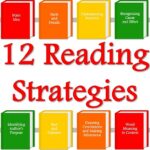8 Learning Strategies To Become A Better Student

1. Repetition
Doing the same thing over and over again may not seem like a lot of fun, but it’s more than effective at helping you break through to greater understanding. Just think back to when you were in grade school and were learning spelling words. Most of the time, you started each unit with a list of words that you had to write out by hand three to five times and turn in to your teacher. Now usually your teacher wouldn’t actually look over the words to see if you’d done them correctly, but she would test your mastery through spelling tests. If you did poorly on those, it was probably because you cut corners on the repetitious part of learning. While we know it can be boring to do the same thing over and over again, the mastery that you can achieve as a result is a nice payoff. And that’s why you still learn this technique when it comes to internalizing definitions or important dates.
2. Making connections
The human brain has a knack for making better sense out of new concepts if it is able to relate that new with something already understandable. By relating to our past experiences — be it something we’ve read about in a book, heard on the news, or experienced in life — we make valuable connections that enable new information to become internalized. Making connections can actually be fun if you set out to do it, because no one can tell you that this or that is a “wrong” connection. If it makes sense to you and it helps you to remember what you’re reading, then it’s right every single time.
3. Start from the top
When trying to learn anything in life, you’re better off starting at the top. Why is that? “The top” assumes that you already know the basic information necessary to get ahead. “The top” allows you to see how the information is applied and is practical. “The top” grants you the ability to focus on complete and total understanding without getting bogged down by the basics. Once you’ve seen this in action, understanding of the basics is much easier to achieve. It’s why you’d rather be in an internship with Mark Cuban than taking an introductory business class from an adjunct professor.
4. Challenge yourself
Short story writers are often told to start submitting to the highest-paying publications first rather than the startups. The logic is simple: if you submit your stories to publications that pay well and publish things by Stephen King every month, you’re going to be aware of how important it is to put your best foot forward. You’re going to proof a little harder, question character decisions and opening lines, etc. You can’t afford to be anything but your best if that’s your competition. While you’ll probably still get a “no” (at first), you’ll be better equipped at approaching smaller publications that are more likely to accept your story. In the same way, you should never be content with where you are. If you feel that you’ve achieved a level of mastery over a subject, push yourself into some other aspect that you don’t understand. There is always more to learn, and as long as you ARE learning, then you’ll be better off than most of your peers.
5. Ask questions
If you’re in class and the teacher says, “Any questions?,” then the only good reason to leave your hand down is if you truly understand what was just said. If you are still struggling with any aspect of a unit, don’t worry about what your classmates will think. Get that hand up there, and ask your questions. Remember: when learning a subject, there are no stupid questions; only stupid people who stay that way because they failed to ask about something they didn’t understand. Chances are, someone else in class is struggling with the same problem but was too afraid to ask.
6. Read, read, read
The simple act of reading more — be it magazines, fiction, non-fiction, comic books and graphic novels — will help you in most any subject. By reading whenever you can, you’re better understanding of how people talk and communicate ideas. If you can grasp that, then it becomes easier to pick up on concepts and ideas that were previously foreign to you. It also makes you a better communicator as well, which will come in handy for our last two learning strategies.
7. Write, write, write
Writing is a natural extension of reading. You will want to sit down with pen and paper and take notes whenever the teacher is talking. It’s also good practice to start off a study session by blasting out all of your knowledge onto the page before getting back into the study materials. What writing essentially does for you is this: it forces your brain to slow down and piece together exactly what it knows in a logical, coherent manner. Writing it all out will also help you realize where there are gaps in your knowledge of a given topic.
8. Teach, teach, teach
Don’t think that you have to be an expert in a field in order to effectively teach it. The act of teaching can be more about helping yourself to a better understanding than helping other people. That’s why we would recommend starting your own blog on a given topic. Teach others what you know, and you’ll be surprised as to what they’re willing to teach you as a result.
In Summary
Learning strategies are vital to your educational growth, and they can help you achieve some truly remarkable results as you move up the educational ladder. Above all, never limit yourself to what you perceive your talents to be or your own natural understanding. Push yourself a little harder and put these techniques to work in your own life. The sky is the limit.








